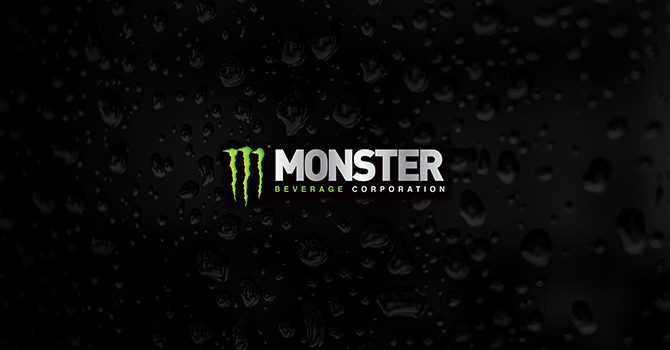
Monster Energy endured an uneven second quarter, as state lockdowns and decreased foot traffic depressed sales early on before improving during the later weeks, according to an earnings report released by the company on Tuesday.
Net sales for the second quarter of 2020 were down just under 1% to $1.09 billion, compared with $1.10 billion in the same period last year. For the first six months of 2020, ending June 30, Monster’s net sales are up 5.2%, to $2.16 billion.
In a press release, Monster attributed the sales decline in part to inventory reductions by the company’s bottlers and distributors and to decreased foot traffic in the company’s largest retail channel, gas and convenience. However, after a dip in April, the brand said it saw incremental growth in May and June that has continued into July, and that depletions from bottlers working through their inventories is trending positively. As consumers shifted to staying home, the brand’s e-commerce business also picked up momentum, increasing 269% during the quarter.
“We remain pleased with our performance in the second quarter,” said Rodney Sacks, Monster CEO and chairman. “EMEA sales were more impacted in the quarter, and especially so in our Strategic Brands, but overall, we are experiencing sequential improvements each month. Our supply chain remains intact, and we are continuing to service our customers.”
Within its Energy Drinks segment, composed primarily of the core Monster Energy line and performance energy drink Reign Total Body Fuel, net sales increased just under 1%, to $1.03 billion, compared to $1.02 billion for the same period last year. Net changes in foreign currency exchange rates had an unfavorable impact of around $16.8 million for the quarter.
The biggest sales decline occurred in Monster’s Strategic Brands portfolio, which fell 24.7%, to $59.6 million, during Q2.
Net sales outside the U.S. also fell from $343.3 million in Q2 2019 to $328.3 million this year. The segment represented around 30% of the company’s total net sales in Q2 2020, a 1% drop from the same period last year.
While noting stability within the company’s supply chains and the influence of the timing of holidays in depressing gross sales in July, Sacks reiterated that the pandemic, which has surpassed 4 million cases in the U.S., remains a serious concern.
“If the COVID-19 pandemic and related and favorable economic conditions continue to intensify, the negative impact on our sales, including our new product innovation launches, could be prolonged and may become more severe,” he said.
During the Q&A portion of the call, Sacks was noncommittal when asked about the company’s potential interest in launching an alcoholic beverage product, specifically a hard seltzer.
Based on a preliminary report, analysts from Goldman Sachs Equity Research believe Monster could potentially capture around 7% of the hard seltzer category and bring in $1.4 billion in annual retail sales by 2025, assuming an early 2021 launch date.
Five years after leaving its distribution agreement with Anheuser-Busch InBev to sign with Coca-Cola, the analysts wrote that the beer giant may be more favorable to partnering with Monster on a potential hard seltzer product. With those distributors eager for innovation and with Coke having revealed its plans to enter hard seltzer via Topo Chico, they observed, the conditions for Monster and ABI to reunite could be in place.
While Sacks acknowledged that the company’s recent registration of certain product names helped spark rumors about a potential move into alcohol, he said the company was still evaluating both alcoholic and non-alcoholic extensions and that “some of those names may well be used by us for an alternative brand within the energy space.”
“There’s been a lot of speculation, and we are definitely looking at it and evaluating it, but we’ve not made any decisions,” said Sacks, according to a transcript of the call. “So at this point, it is premature for us to give any indication to the market of what our plans are because we have not firmed up our plans internally ourselves yet. There’s been no definitive decision on when to launch, what to launch and under what brand names.”
He also mentioned that Monster has CBD products “in development,” but that, for now, the company was “looking in from the sidelines” until the regulatory environment is clarified.
Sacks briefly brought up Monster’s ongoing litigation with Bang Energy maker Vital Pharmaceuticals/VPX, which includes multiple proceedings and counterclaims, only to state that he would not be answering questions on the subject.
According to data from Nielsen, energy drink sales increased 11.3% over the four-week period ending July 25. Monster sales were up 7.3% during that time, though far outpaced by Red Bull, which was up 22.1%.
When asked about Red Bull’s rampant growth, Sacks noted that, unlike Coca-Cola and many other CPG giants, Red Bull did not pull their sales and merchandising teams actively out of the field during the pandemic.
“On balance, I think, they probably out-distributed us in terms of displays and other points of purchase on store shelves and on the floors of the stores,” he said. “And that’s something that we’re working to pretty aggressively with our field people back in the stores to regain.”
Another version of this story appeared on Brewbound’s sister website, BevNet.
"entry" - Google News
August 06, 2020 at 03:53AM
https://ift.tt/2C73oGA
Monster CEO Noncommittal on Entry into Alcoholic Beverage Space - Brewbound.com
"entry" - Google News
https://ift.tt/3f5ZAUJ
https://ift.tt/3d6LMHD
Bagikan Berita Ini














0 Response to "Monster CEO Noncommittal on Entry into Alcoholic Beverage Space - Brewbound.com"
Post a Comment